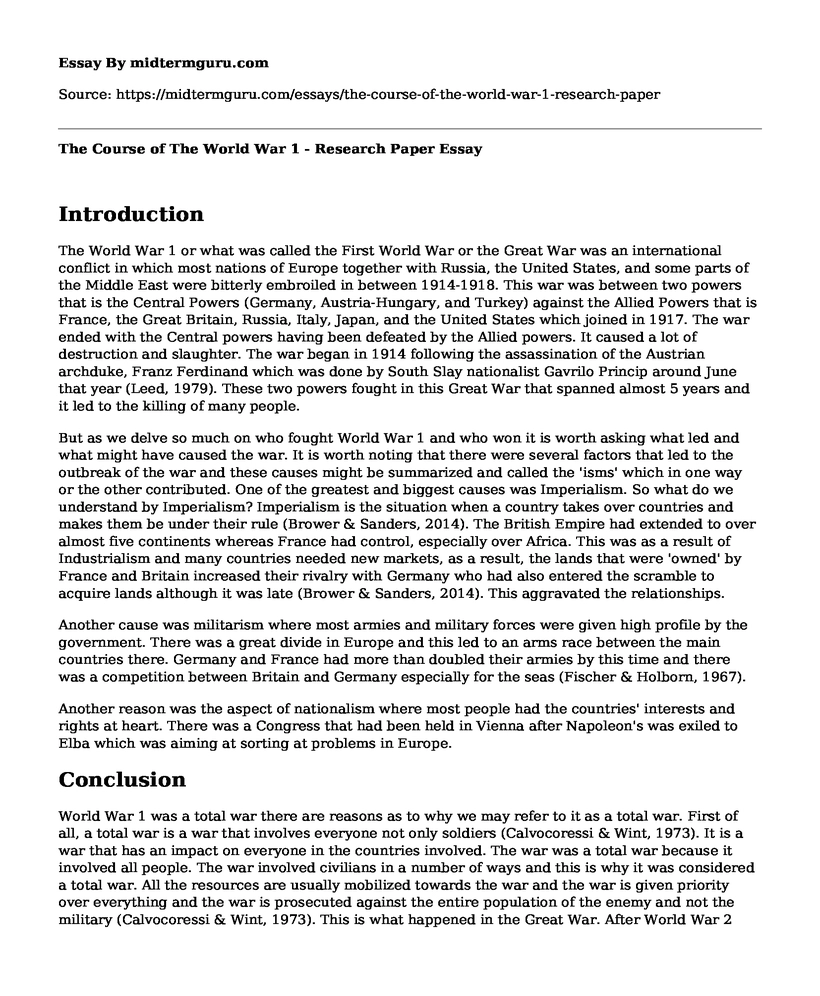Introduction
The World War 1 or what was called the First World War or the Great War was an international conflict in which most nations of Europe together with Russia, the United States, and some parts of the Middle East were bitterly embroiled in between 1914-1918. This war was between two powers that is the Central Powers (Germany, Austria-Hungary, and Turkey) against the Allied Powers that is France, the Great Britain, Russia, Italy, Japan, and the United States which joined in 1917. The war ended with the Central powers having been defeated by the Allied powers. It caused a lot of destruction and slaughter. The war began in 1914 following the assassination of the Austrian archduke, Franz Ferdinand which was done by South Slay nationalist Gavrilo Princip around June that year (Leed, 1979). These two powers fought in this Great War that spanned almost 5 years and it led to the killing of many people.
But as we delve so much on who fought World War 1 and who won it is worth asking what led and what might have caused the war. It is worth noting that there were several factors that led to the outbreak of the war and these causes might be summarized and called the 'isms' which in one way or the other contributed. One of the greatest and biggest causes was Imperialism. So what do we understand by Imperialism? Imperialism is the situation when a country takes over countries and makes them be under their rule (Brower & Sanders, 2014). The British Empire had extended to over almost five continents whereas France had control, especially over Africa. This was as a result of Industrialism and many countries needed new markets, as a result, the lands that were 'owned' by France and Britain increased their rivalry with Germany who had also entered the scramble to acquire lands although it was late (Brower & Sanders, 2014). This aggravated the relationships.
Another cause was militarism where most armies and military forces were given high profile by the government. There was a great divide in Europe and this led to an arms race between the main countries there. Germany and France had more than doubled their armies by this time and there was a competition between Britain and Germany especially for the seas (Fischer & Holborn, 1967).
Another reason was the aspect of nationalism where most people had the countries' interests and rights at heart. There was a Congress that had been held in Vienna after Napoleon's was exiled to Elba which was aiming at sorting at problems in Europe.
Conclusion
World War 1 was a total war there are reasons as to why we may refer to it as a total war. First of all, a total war is a war that involves everyone not only soldiers (Calvocoressi & Wint, 1973). It is a war that has an impact on everyone in the countries involved. The war was a total war because it involved all people. The war involved civilians in a number of ways and this is why it was considered a total war. All the resources are usually mobilized towards the war and the war is given priority over everything and the war is prosecuted against the entire population of the enemy and not the military (Calvocoressi & Wint, 1973). This is what happened in the Great War. After World War 2 there has never been another total war and we know that WW2 had a lot of impacts especially to the civilians. Whereas the WW1 resulted in the killing of 1/10 civilians the WW2 resulted in 2/3 death of civilians. Since then there has never been another total war as many wars usually involve the military in a big way and the civilians are not so much involved in the wars. Since US independence in 1776, the country has been at war for many years like 222 years out of 229 years.
References
Brower, D., & Sanders, T. (2014). The world in the twentieth century: From empires to nations (7th ed.). Boston, MA: Pearson.
Calvocoressi, P., & Wint, G. (1973). Total war (Vol. 2). Ballantine Books.
Fischer, F., & Holborn, H. (1967). Germany's aims in the First World War (p. 120). New York: WW Norton.
Leed, E. J. (1979). No man's land: combat and identity in World War 1. CUP Archive.
Cite this page
The Course of The World War 1 - Research Paper. (2022, Aug 29). Retrieved from https://midtermguru.com/essays/the-course-of-the-world-war-1-research-paper
If you are the original author of this essay and no longer wish to have it published on the midtermguru.com website, please click below to request its removal:
- Research Paper on Life of St Antony
- Essay Sample on Texas During the Great Depression
- Drama of the Alexander Hamilton During His Reign as the Secretary to the Treasury - Research Paper
- How the Great Depression Affects Us Today - Essay Sample
- Essay Sample on "Slavery Footprint Survey"
- WWI: Complex Causes, Profound Impact - Essay Sample
- U.S. Declares War on Germany in April 1917 - Essay Sample







